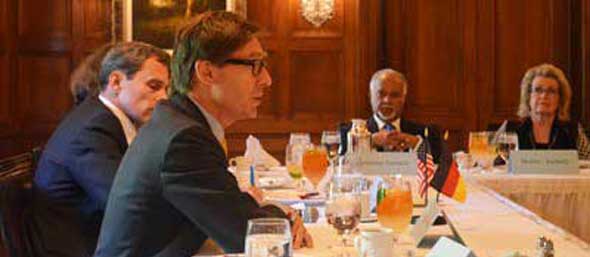 German Ambassdor to the US, Peter Wittig, speaking at the Council
German Ambassdor to the US, Peter Wittig, speaking at the Council The Russian annexation of Crimea has precipitated a "total paradigm shift" in Europe, where countries that had become used to peaceful borders and declining defense budgets have suddenly had to reevaluate their most fundamental assumptions of coexistence, according to Germany's Ambassador to the US, Peter Wittig. "Geo-politics is back," said Wittig at a roundtable lunch for Directors and International Circle members of the LA World Affairs Council on Monday. "Russia has become a revisionist state by violating the norms of fixed state borders - we are now at the end of the post-Cold War period, and we might be facing a bumpy future with Russia."
In fact, said Wittig, Russian aggression in Ukraine and the emergence of ISIS in the Middle East may well make 2014 stand out in history as a "threshold year" - and not in a good sense. "What we are seeing is that the entire liberal international order is under pressure." Germany after the Nazis became essentially "mentally demilitarized", Wittig said, but now under threat from Russia Germany is being forced to rethink its military posture. For the first time since the fall of the Berlin Wall, there is a real fear spreading - in Germany, the Baltic states, Poland and throughout eastern Europe - that military confrontation could return to Europe. One lesson from this is "we need that transatlantic alliance more than ever! Some people are talking of a renaissance of NATO."
Despite the unpredictability of Russia's President Putin, Wittig said that the western response has been consistent and well-coordinated between Washington and Berlin. First, Ukraine needed continuing economic support, because "we cannot afford a failed Ukrainian state in the center of Europe - that would be an easy catch for Russia." Secondly it has been important to reassure those European states "who have been scared to death by Putin's land grab" - primarily the Baltic states and Poland. This means reconfirming that the guarantee of NATO's Article 5, under which an attack on any individual NATO member is treated as an attack on all of NATO, is credible. And the third part of the policy has been the sanctions imposed on Russia, which were ultimately agreed upon by all 28 members of the European Union, under the strong persuasion of Germany's Chancellor Angela Merkel. "It was important that we did not fall apart," said Wittig. "Putin probably thought that the west would not stick together."
As a result of these coordinated western policies, "a hot war has been prevented - we are not happy with the situation, but at least it has been contained." Wittig acknowledged there was still a fault line within the US Congress over the question of providing weapons to the Ukrainian military. Berlin's position is that this is not a good idea - "not because it is a moral issue - the Ukrainians have the right to defend themselves," and were weapons to come from some third country it would not be a big deal. But if the US were to provide arms, Germany believes it would be politically dangerous and "could lead Putin to double down, maybe strike somewhere else, maybe use that as an occasion to show he is stronger."
On Iran, Wittig, who had been Germany's Ambassador to the UN prior to his current position, said that the current deal "is not a bad deal, not an ideal deal, but a justifiable deal." And, he added, "we are not there yet". The April 2nd announcement was just a framework, and "the most difficult part may be still ahead in the next 10 weeks." But, Wittig, said, the alternatives to a negotiated deal are uniformly worse. Either we go to war, bombing Iran's nuclear facilities, which will only stop enrichment temporarily, since "one cannot bomb away the knowledge". Or we back away from a deal which is then put down to American intransigence, and the US loses "the blame game", allowing nations like the Chinese, Russians, Indians and Brazilians to disregard the sanctions, at which point we lose all leverage over Iran.
Asked about the role of energy supplies in the confrontation between Putin and Europe, Wittig said "the quest for energy independence from Russia is the new paradigm, and it is irreversible." Even if the Ukraine crisis is solved, Europeans are determined not to remain dependent on supplies of gas from Russia, but the retooling of the energy infrastructure of Europe will take quite some time.
On the subject of Greece and the new crisis in the Eurozone, Wittig said Germany wants to keep Greece in the Eurozone, but "we expect them to stick to the agreements made by previous [Greek] governments." He said the negotiations with Greece were difficult, but had to be worked through. In response to a question Wittig said that the issue of German war reparations to Greece, which had been brought up recently by some Greek politicians, while understandable from a historical point of view, was not really relevant to the current discussions over restructuring the Greek debt. "We need to come to an agreement with Greece by the end of June on their relationship to the Eurozone."
